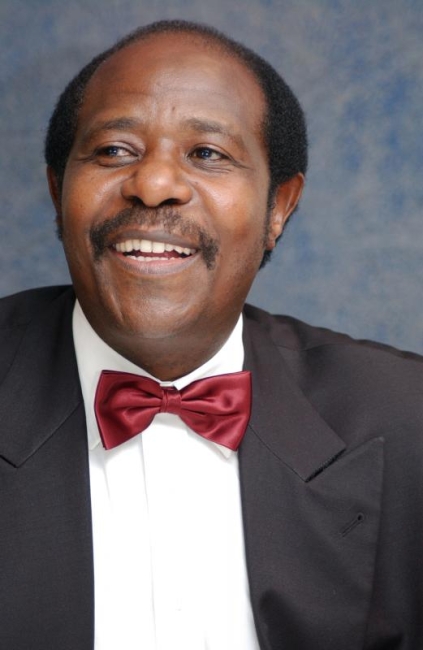You have /5 articles left.
Sign up for a free account or log in.

The case of Paul Rusesabagina, who is pictured during a press conference for the movie ‘Hotel Rwanda’ in 2004, was discussed during an April videoconference at St. Mary’s University in Texas that has led to spying accusations against a Rwandan diplomat.
Vera Anderson/WireImage/Getty Images
On April 6, students in Bill Israel’s international communication class at St. Mary’s University in Texas met for a Zoom session featuring guest speakers there to discuss a campaign to free Paul Rusesabagina.
Rusesabagina is internationally recognized for his heroism during the 1994 genocide in Rwanda, when he was credited with protecting the more than 1,200 guests of the hotel he managed from the massacre.
Rusesabagina, a Belgian citizen, U.S. permanent resident and winner of the Presidential Medal of Freedom whose story was dramatized in the 2004 movie Hotel Rwanda, is now jailed in Rwanda, facing charges of terrorism, murder and arson. In recent years, he had emerged as a chief critic of Rwanda’s authoritarian president, Paul Kagame, and the leader of an opposition coalition in exile, the Rwandan Movement for Democratic Change, which includes an armed wing. As ABC News recently reported, Rusesabagina has acknowledged the movement includes an armed wing but has denied involvement in that wing, saying his work focused on diplomacy.
Human Rights Watch has raised concerns that it is unlikely that Rusesabagina will receive a fair trial in Rwanda, where he was taken against his will -- he reportedly thought he was flying to Burundi -- in what Human Rights Watch characterizes as an “enforced disappearance," a crime under international law.
Israel’s international communication class wasn’t originally focused on Rusesabagina. But the focus shifted upon learning that Rusesabagina’s son, Tresor, was among the 10 students enrolled.
"The deeper we got into Tre’s experience, it became clear that in terms of a final project, my students needed an opportunity to pursue this more deeply,” Israel said. “There couldn’t be a clearer case of international communication in dispute.”
On April 6, the class held a hybrid in-person/Zoom session with invited guests, including Rusesabagina’s wife and daughter, to discuss an ongoing campaign seeking Rusesabagina’s freedom and how the St. Mary’s students could help. It was only toward the end of the class session that a St. Mary’s information technology specialist, Jeff Schomburg, flagged a seeming lurker on Zoom whose name appeared as MN.
Israel paused the class to ask MN to identify him or herself. After receiving no response, he asked again. When he again received no response, he asked Schomburg to terminate MN's connection.
Schomburg and other colleagues subsequently determined that MN shared an IP address with a Charles Ntageruka, who briefly entered and exited the Zoom call earlier in the class, unnoticed at the time, before re-entering under the name MN. Ntageruka matches the name of the second counselor at the Rwandan Embassy in Washington, D.C.
The Rwandan Embassy did not reply to requests for comment apart from saying it had forwarded a request to Ntageruka’s office for “their consideration and discretion.” Ntageruka did not respond to a message sent via LinkedIn.
Israel said he reported the incident to the Federal Bureau of Investigation. An FBI spokesperson confirmed the bureau was aware of the incident but declined comment.
“I’m offended that my students and my guests were invaded and intruded upon by a foreign entity that clearly has malevolent intentions, and we don’t intend to let go of this,” Israel said.
Apart from the seeming intruder, Rusesabagina's son Tresor and daughter Ananise Kakimba, as well as a longtime Rusesabagina family friend, Kathleen Kreuger -- all of whom participated in the April 6 class -- said they felt uncomfortable because of the presence of another attendee in the meeting who they say has ties to the Rwandan government. All three said the attendee had been invited to participate by Céline Jacquemin, a professor of political science at St. Mary’s who specializes in Rwanda.
Jacquemin, who was invited by Israel to participate in the class session, referred questions on the matter to Jennifer Lloyd, a St. Mary’s spokeswoman.
Lloyd emailed a statement on behalf of St. Mary’s.
"The matter has been referred to the FBI for investigation, including how an individual presumably in Rwandan President Paul Kagame's diplomatic corps gained access to the class," the statement says. "All of those invited to the class were included on the presumption that they would be a positive contributor to the class discussion. It is unfortunate that some of those who gained access to the class appeared to have other intentions than to work together for the benefit of our students."
St. Mary’s president, Tom Mengler, also weighed in on the incident in strong terms.
“Desperate people take desperate measures,” Mengler said in a press release. “This intrusion by a member of President Kagame’s diplomatic corps into a St. Mary’s class shows the paranoia of President Kagame’s administration in seeking to quell a rising chorus of international outrage over its kidnapping of Mr. Rusesabagina.”
The Rwandan government’s aggressive tactics targeting its critics abroad were documented in a recent report from Freedom House, a nonprofit organization that promotes democracy worldwide.
“Rwandan transnational repression is exceptionally broad in terms of tactics, targets, and geographic reach,” the Freedom House report said. “Rwandans abroad experience digital threats, spyware attacks, family intimidation and harassment, mobility controls, physical intimidation, assault, detention, rendition, and assassination. The government has physically targeted Rwandans in at least seven countries since 2014, including the Democratic Republic of Congo (DRC) and Kenya, as well as farther afield in South Africa, the United Arab Emirates, and Germany. Rwandans as far-flung as the United States, Canada, and Australia report intense fears of surveillance and retribution.”
Tresor Rusesabagina said the incident in the classroom was very upsetting.
"Before this whole situation, my dad was taken abruptly out of our lives by the government that’s been hunting him for well over 15 years," he said. "As long as I can remember, I had to worry about my family. As soon as that happened, I worry about my mom, I worry about my brother, I worry about my nieces, and then I go to class and that happens."
Ananise Kakimba, Rusesabagina’s daughter, said she was surprised the Rwandan officials “would track us down to my brother’s classroom … This is the second counselor to the ambassador. To think that they would dedicate the two hours to listen to what I had to say and to what the students had to say to help us, I just found it very scary.”
Kreuger, the Rusesabagina family friend and the wife of former U.S. senator and ambassador Bob Krueger, was also outraged.
“That a high-ranking Rwandan government official in the United States spied on American citizens and jeopardized the safety and security of American students who were present simply to try to bring justice to an imprisoned, innocent man -- that offends me so much. It just angers me,” Kreuger said. “The rest of us, we’re adults, we understand the risks, we participate openly knowing those risks and have been for years, but those students are young, innocent victims of Rwandan harassment and espionage, and that should offend any decent person.”








